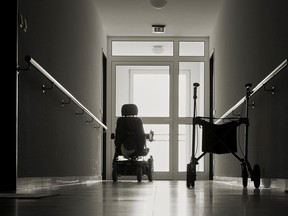Lengthy-Time period Care Minister Paul Calandra stated sufferers’ rights might be revered, however advocates need the proper to French language providers particularly spelled out within the invoice’s laws

Article content material
Advocates say Ontario’s Extra Beds, Higher Care Act (Invoice 7) might threaten the rights of franco-Ontarians to obtain care of their first language of alternative.
Commercial 2
Article content material
The act, which was handed within the Ontario legislature Aug. 31, permits well being authorities to maneuver sufferers who’re in hospitals ready for long-term care beds to a house they haven’t chosen with a purpose to unencumber hospital area.
Article content material
The act has attracted widespread criticism from those that say it tramples on the rights of the aged, disabled and different folks in want of long-term care. Advocates for the aged say it locations a disproportionate burden of the health-care disaster on the backs of these ready for long-term care beds.
There are extra issues in regards to the influence the act can have on francophones, particularly since there are restricted francophone long-term care areas throughout the province.
Final week, Ottawa-Vanier Liberal MPP Lucille Collard raised the difficulty in query interval at Queen’s Park.
Commercial 3
Article content material
She stated francophone households are anxious.
“Households are afraid (their family members) could be transferred to properties distant from their very own dwelling the place they can not have providers within the French language,” she stated.
Lengthy-Time period Care Minister Paul Calandra responded that sufferers’ rights might be revered. However advocates need the proper to French language providers particularly spelled out within the invoice’s laws, that are anticipated to be launched in larger element within the coming days. They’re additionally anticipated to include particulars about how distant sufferers ready for long-term care might be moved whereas they look forward to a everlasting mattress.
Jacinthe Desaulniers, president and CEO of the French Language Well being Providers Community of Japanese Ontario, stated she understands the difficult state of affairs in Ontario’s hospitals proper now and the necessity to enact daring methods to deal with it, however she stated language needs to be a key a part of determination making in relation to shifting hospital sufferers ready for long-term care beds.
Commercial 4
Article content material
“I want to see within the laws (for the act) that distance and linguistic id be two components thought of,” she stated.
-

Sufferers extra prone to die, have severe outcomes when their physicians do not converse their most well-liked language
-

Ottawa girl pressured to take a LTC room she did not need underneath risk of Invoice 7
At the moment, so-called ALC (alternate degree of care) sufferers who’re in hospital beds awaiting a transfer to long-term care are requested to create a listing of 5 properties through which they would favor to stay. Below the Extra Beds, Higher Care Act, sufferers might be moved to a house that’s not on their most well-liked record. Critics say that, regardless of lengthy waits for long-term care beds, some properties have area and that’s typically as a result of nobody needs to go there. That might embody properties with poor information of an infection, loss of life and care in the course of the pandemic.
Commercial 5
Article content material
There’s even much less alternative in relation to properties that present care in French. There are about 15 long-term care properties throughout Japanese Ontario which are both designated underneath the French Language Providers Act or recognized as working towards that designation — which means providers can be found in French.
At Montfort Hospital, sufferers’ first language of alternative is documented at registration. That permits the hospital to supply care and providers of their language and to tell choices corresponding to the selection of lodging after leaving the hospital, stated spokesperson Martin Sauvé.
However Sauvé added that the coordination of long-term care planning shouldn’t be solely within the fingers of the hospital and it’s unclear if Montfort can have a ultimate determination about long-term care placement of sufferers underneath Invoice 7.
Commercial 6
Article content material
“The provision of francophone long-term care areas stays restricted throughout the province,” he stated. “We’re due to this fact involved that Invoice 7, if it doesn’t consider the linguistic traits of sufferers, might considerably scale back entry to French language providers,” he stated.
A latest examine led by Ottawa researchers underscores the significance of individuals receiving well being providers of their first language.
“Forcing a resident into a house that will have language and cultural discordance could have well being penalties,” stated Dr. Peter Tanuseputro, a physician-scientist at The Ottawa Hospital, Institute du Savior Montfort and Bruyere Analysis Institute. He co-led a latest examine that discovered hospital sufferers usually tend to die or have severe outcomes if their doctor doesn’t converse their language. He has printed an identical examine involving long-term care sufferers and stated they’re typically extra susceptible.
Sauvé underscored that language does make a distinction to residents’ well-being.
“Whereas the proposed measures would assist liberate hospital beds, it’s crucial that the language of sufferers be taken under consideration within the alternative of lodging to make sure high quality and security of care, and that these sufferers be capable of obtain care of their language.”
